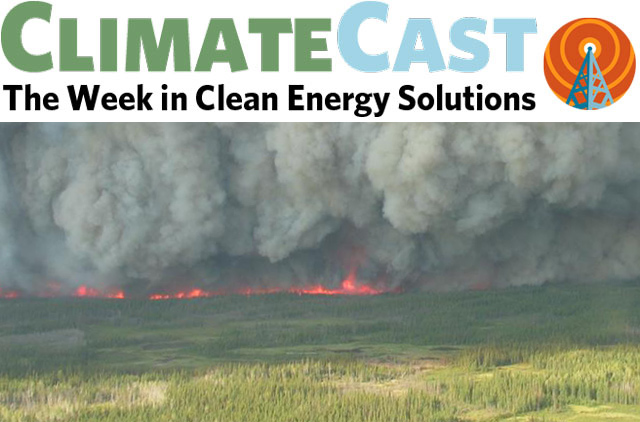Carbon pollution is free in Australia again
Australia repealed its carbon tax last week, as Tony Abbott’s conservative government fulfilled a promise that anchored his 2013 election campaign. While it is undisputed that Australia is the first country to back away from pricing carbon, the move’s significance was widely debated, with several reports describing the political machinations and Labour Party mis-steps that undermined support for the plan, even though it had a distinct effect on the country’s carbon emissions. Observers put little stock in the program of incentives for voluntary carbon cuts that was enacted as a substitute. The only bright spot: a recent poll showing increased American willingness for the U.S. to take the lead on climate.
Oregon business leaders call for climate action
More than 70 Oregon companies called last week for the region to invest in cleaner fuels, advance renewable energy, and reduce greenhouse gas emissions to respond to the threat of climate change. These signatories on the Oregon Business Climate Declaration—including companies such as Nike, Umpqua Bank, and Adidas—joined more than 800 businesses nationwide that have adopted a common set of climate-action principles. The following day, former Bush administration Treasury Secretary Hank Paulson added his voice to the fray in Portland, continuing the Risky Business tour advocating climate action as a sound business proposition.
U.S. fuel economy increases, Minnesota decarbonizes
Increases in U.S. fuel economy standards have paid off, improving the average new car from 23 mpg in the early 2000s to more than 27 mpg today, says an NRDC analyst quoting new figures from the EPA. Those rules are predicted to save motorists $1.7 trillion by 2030. Attention to energy conservation pays off over time: in Minnesota, a decade-long effort to encourage efficiency and renewable energy has cut coal use at power plants by more than a third. The state gets as much power from wind as from natural gas, and has just funded a study of how to make the state economy entirely carbon-free.
Climate impacts felt in Arctic and in our psyches
Present and anticipated climate impacts mounted last week, as fires in Canada’s boreal forests blackened Arctic ice with soot and Bostonians contemplated the possibility of carving canals through low-lying city streets to save landmarks such as Faneuil Hall. These impacts came on the heels of the announcement that the world-average temperature for the last four months was the hottest March-June on record. The cumulative impact of these climatic disruptions is to leave people feeling displaced, according to a survey article on the psychological effects of climate change.
Appalachia struggles to transition out of the coal economy
The drawbacks of the coal-mining economy for working people surfaced long before climate change, according to this in-depth profile of towns in Harlan County, Kentucky. In King Coal’s heyday, mine operators exported the profits and exploited workers through company stores, clinics, and utilities. Then, over the last half-century, mechanization and competition from western coal combined to demolish the coal belt’s economic underpinnings before carbon dioxide regulation was even floated. Local entrepreneurs are trying to capitalize on the region’s assets like farming and folk music, but their efforts would be strengthened with transition programs like those designed for communities facing military base closures or declines in tobacco farming.
Overlaying moral calculus on financial considerations
As a growing number of religious organizations divest from fossil-fuel firms for moral reasons, The Economist last week joined the fracas questioning the financial wisdom of oil companies’ investment strategy. Taking a still more holistic view, Next Generation questioned the economic frame used to judge the impact of climate action, laying out a withering critique of using Gross Domestic Product to evaluate possible policies. Asks one interviewee, “Would you rather have a one percent tax increase on everyone in the country or kill one percent of the population? Because it’s about the same impact [on GDP].”
Obama releases climate infrastructure plan
Communities will get federal help to prepare for climate change-induced storms, flooding, and rising seas, following early findings from the Obama administration’s climate preparedness task force. Specific recommendations include $236 million to help states improve grid reliability in rural areas when extreme weather drives up electricity demand; $10 million to assist tribes with mitigation and adaptation; and mapping tools to help cities prepare for flooding and extreme weather events, as well as pinpoint the best sites for solar and wind. The EPA will also invest in green roofs, urban forests, and other biological stormwater treatment efforts in at least 25 communities.
Experiments to fertilize the seas yield ambiguous results
The controversial effort to sequester more carbon in the ocean by enriching it with iron compounds has come in for renewed scrutiny. Newly published data show that the 2012 freelance fertilization efforts off the British Columbia archipelago of Haida Gwaii increased ocean photosynthesis and zooplankton populations, though scientists caution there’s no telling that salmon runs increased because of this experiment. Another team trying a similar technique in the Southern Ocean also found it increased the flow of carbon to the ocean floor—but as with the B.C. experiment, these efforts may not be more cost-effective than proven ways of keeping carbon out of the air.





